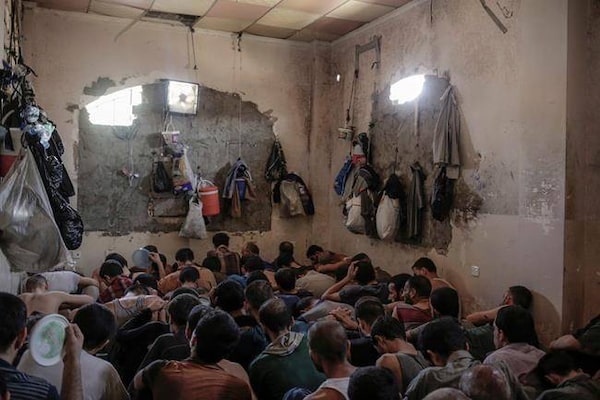
Suspected Islamic State members sit inside a small room in a prison south of Mosul, Tuesday, July 18, 2017. Hundreds of suspected Islamic State members swept up by Iraqi forces in Mosul are being held in a cramped and stifling prison just outside the city.Bram Janssen/The Associated Press
The Canadian government says it is looking into reports that two Canadian women were among a group of 20 Islamic State militants captured by Iraqi forces following the terrorist group's defeat in Mosul last week.
Global Affairs Canada said it is aware of reports citing an Iraqi counterterrorism official saying that 20 women – including two Canadians, five Germans, three Russians, three Turkish citizens, a Chechen and six from Libya and Syria – were detained by Iraqi counterterrorism units late last week.
"We are aware of these media reports. Canadian officials are contacting local authorities and gathering additional information," Global Affairs spokesperson Jocelyn Sweet said in an e-mail.
In a report Tuesday morning, Iraqi counterterrorism official Haider al-Araji said the women were captured in a secret tunnel in the Quleiat neighbourhood of Mosul, which was under Islamic State control until last week when the Iraqi forces liberated the city.
Globe editorial: After IS is defeated, what comes next?
"The women had weapons and explosive belts meant to attack Iraqi troops," Mr. al-Araji told Kurdistan 24, an Iraqi Kurdish broadcast news station.
German newspaper Die Welt said authorities are investigating evidence that a 16-year-old German citizen named "Linda W." could be among the women arrested in Mosul last week. The schoolgirl fled Germany in 2016.
Herman Deparice-Okomba, director of the Centre for the Prevention of Radicalization Leading to Violence in Montreal, has been in touch with some of the families of Canadians who travelled overseas to join the Islamic State, including six women. He said the families have been worried about their fate since the bombardment of Mosul.
"After what happened in Mosul, of course they were worried because they didn't have any news," Mr. Deparice-Okomba said through a translator.
Mr. Deparice-Okomba said he was in contact with the Iraqi government Tuesday morning and is waiting to hear if any Canadians were captured in Mosul.
He said the centre is aware of six Canadian women who became foreign fighters and that all of them have had babies since travelling overseas, raising concerns about the well-being of their children who are entitled to Canadian citizenship by descent.
Amarnath Amarasingam, senior research fellow at the London-based Institute for Strategic Dialogue, said that if the reports out of Iraq are true, the captured Canadian women are likely from Quebec.
"Since the majority of girls we know of are from Quebec, it makes sense statistically that they may be from Quebec," said Mr. Amarasingam, who has also been in touch with the families of Canadians who have travelled overseas to join the Islamic State.
Mr. Amarasingam said he was not surprised by Tuesday's report, adding that more female foreign fighters are likely to pop up in the coming months.
"I think with husbands fighting and dying, a lot of these women are going to start surrendering or get captured trying to blend into the civilian population. The foreign fighters who are not Arab or don't speak the language are going to of course have a hard time blending in."
The Centre for the Prevention of Radicalization Leading to Violence estimates there are currently about 150 to 180 Canadian foreign fighters. Mr. Amarasingam said there are about 100 in Syria and Iraq, of which about 15 to 20 are Canadian women.
In its 2016 public report on the terrorist threat to Canada, Public Safety Canada said women constitute approximately 20 per cent of extremist travellers from Canada. The department said it's not clear what role female foreign fighters perform.
"The most commonly held assumption is that women travel abroad to marry terrorists, but the reasons for travel and eventual roles vary. Some may occupy secondary roles within terrorist groups, while in other cases they appear to be training and taking part in combat. Some women have also facilitated the travel of others," the report said.